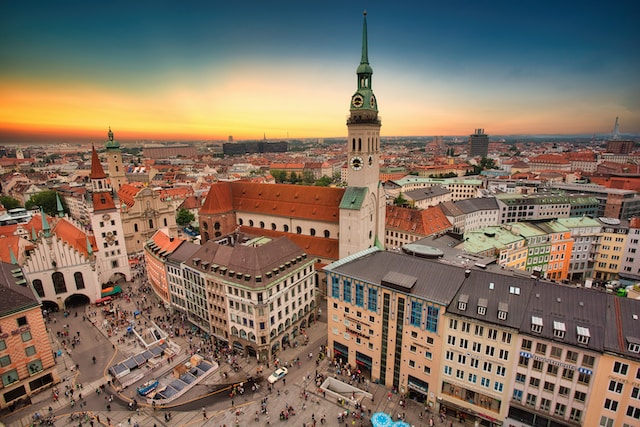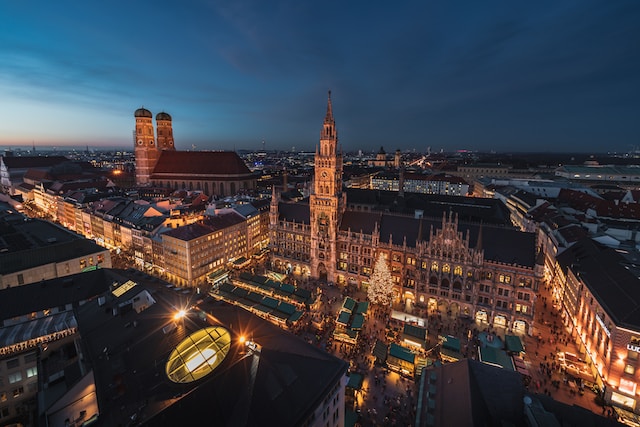Two significant cities in Europe, Munich and London, each have a distinct culture, history, and allure of their own.
While there are some similarities between them, they also clearly differ from one another, particularly in terms of size, cost of living, weather, transportation, and job prospects.
This article focuses on the difference between the two cities.
Contents
Size: Which City Is Bigger?
London is a significantly bigger city than Munich in terms of both population and geographic size.
If we talk about population, London is one of the largest cities in the world with a population of over 8 million people, making it the largest city in the United Kingdom and the European Union.
On the other hand, Munich is the third-largest city in Germany with a population of around 1.47 million people. This means that London’s population is almost six times larger than Munich’s.
In terms of geographic size, London covers an area of around 1,580 square kilometers, while Munich covers an area of around 310.43 square kilometres.
This shows that London is over five times larger than Munich in terms of geographic size.
London is also a more diverse city than Munich, with a large population of people from different ethnicities, cultures, and religions. Munich, on the other hand, has a more homogenous population.

Moreover, both cities have many interesting landmarks and attractions.
The Tower of London, Buckingham Palace, the London Eye, and the Houses of Parliament are just a few of the city’s well-known landmarks.
It features a strong arts and culture scene with a wide variety of theaters, galleries, and museums.
Munich, on the other hand, is renowned for its exquisite architecture, which includes the Nymphenburg Palace and the Neuschwanstein Castle.
Cost Of Living: Which City Is More Affordable?
When comparing the cost of living between the two cities, several factors must be taken into account, such as accommodation, food, transportation, and entertainment.
In the case of London and Munich, both cities are known for their high quality of life, but they also come with a high price tag.
- Accommodation:
The cost of accommodation in both cities is relatively high, but London tends to be more expensive.
The average monthly rent for a one-bedroom apartment in the city center of London is around £1,800 to £2,500, while in Munich, it is around €1,200 to €1,800, but the cost of accommodation depends on the location and the type of apartment.
- Food:
When it comes to food, both cities have a wide variety of options, from street food to high-end restaurants.
However, the cost of groceries tends to be higher in London compared to Munich. A typical meal in a mid-range restaurant in London costs around £15-£25, while in Munich, it is around €10-€15.
In terms of groceries, a liter of milk costs around £0.90 in London and around €0.70 in Munich.
- Transportation:
The cost of transportation in London tends to be higher than in Munich. A single one-way ticket for public transportation in London costs around £2.50 to £4.90, while in Munich, it costs around €2.90.
London has an extensive public transportation network, including buses, trains, and the famous London Underground, which makes it easier to get around the city.
- Entertainment:
Both London and Munich have a lot to offer in terms of entertainment, from museums to parks to theaters, but the cost of entertainment tends to be higher in London.
For example, a ticket to the theater in London can cost around £50-£100, while in Munich, it is around €30-€50.
Weather: Which City Has A Better Climate?
London and Munich are two major cities in Europe with distinct climates. While both cities experience four distinct seasons, there are significant differences in temperature, precipitation, and sunshine hours.
London has a temperate maritime climate, characterized by mild winters and cool summers.
The average temperature in January, the coldest month, is around 5°C (41°F), while in July, the warmest month, it’s around 19°C (66°F).

London receives an average of 23 inches of rainfall per year, with the wettest months being October and November.
Sunshine hours in London are relatively low, with an average of 1,481 hours per year.
Munich, in comparison, has a humid continental climate, which is characterized by warm summers and cold winters.
The average temperature in January is around -1°C (30°F), while in July, it’s around 19°C (66°F). It receives an average of 30 inches of rainfall per year, with the wettest months being May and June.
Sunshine hours in Munich are higher than in London, with an average of 1,711 hours per year.
Overall, Munich has a colder climate than London, with more extreme temperatures in both winter and summer.
While London has milder temperatures, it receives more rainfall throughout the year, which may not be appealing to some.
Munich, on the other hand, has drier summers and more sunshine hours, making it a more attractive destination for those who enjoy outdoor activities.
Transportation: Which City Is More Accessible?
Both London and Munich are major cities with developed transportation systems.
However, due to its bigger size and a wider range of public transit alternatives, London may have a tiny advantage in terms of accessibility.
- Public Transportation:
London has an extensive public transportation system, including the famous London Underground (also known as the Tube), buses, overground trains, and trams.
The Tube alone has 11 lines and 270 stations, which makes it one of the most extensive subway systems in the world.
Additionally, London has a vast network of buses and trains that can take you to every corner of the city. It also has several airports, including Heathrow, Gatwick, and London City, which makes it easy to travel in and out of the city.
Munich also has an excellent public transportation system, including the Munich U-Bahn (subway), buses, trams, and S-Bahn (overground trains).
The Munich U-Bahn has eight lines and 96 stations, which is a considerable network. Munich also has an international airport, Munich Airport, which makes it easy to access the city from other countries.
When it comes to the size of the transportation network, London’s system is more extensive than Munich’s, with more lines, stations, and connections.
- Accessibility for People with Disabilities:
Both London and Munich have made significant efforts to make their transportation systems more accessible to people with disabilities.
For example, both cities have wheelchair-accessible buses, trains, and stations, as well as designated seating areas and priority boarding.

London also has a “step-free” initiative that aims to make the entire public transportation system accessible to people with mobility impairments.
This means that all stations on the Tube, DLR (Docklands Light Railway), and London Overground have step-free access, and many buses and trams are also accessible.
Munich has also made strides in making its public transportation system more accessible, with wheelchair-accessible stations and vehicles.
However, the city’s older infrastructure can pose challenges for people with disabilities, especially in older buildings and stations that may not have been designed with accessibility in mind.
- Cost:
The cost of public transportation in London and Munich can vary depending on several factors, such as distance, mode of transportation, and time of day.
In London, the cost of a single journey on the Tube or bus is £2.40 with an Oyster card, which is a smart card that you can top up with credit.
The maximum daily fare with an Oyster card is £7.20, and you can also purchase a weekly or monthly travelcard for unlimited travel within certain zones.
In Munich, the cost of a single journey on the U-Bahn or bus is €3.30, and a day ticket is €7.80. The city also offers several types of tickets and passes for frequent riders and visitors.
Jobs: Which City Has Better Job Opportunities?
Both London and Munich are thriving, cosmopolitan cities with a variety of job markets and strong economies.
Although there are many fantastic work prospects in both locations for qualified individuals, there are some significant differences to take into account.
First of all, the financial services sector in London is highly advanced and sophisticated.
This implies that financial industry specialists, such as investment bankers, traders, analysts, and accountants, have numerous career options.
A thriving technology industry is also present in London, where the headquarters of numerous startup and well-established tech companies are located.
IT specialists, data analysts, and software developers can find work in this industry.
Whereas Munich is a significant center for innovation and research with a concentration on the manufacturing, automotive, and engineering sectors.
Numerous industry-leading businesses, including BMW, Siemens, and Audi, are based in the city.

With firms like Google and Microsoft having a sizable presence in the city, Munich also has a thriving technology sector.
Furthermore, the startup sector in Munich is growing, with a large number of new businesses appearing in industries like biotech, renewable energy, and finance.
When it comes to job opportunities, both London and Munich offer advantages and disadvantages depending on your field and experience.
London’s financial and tech industries offer lucrative job opportunities, but the cost of living in the city is high, and competition for jobs can be intense.
Munich, on the other hand, offers a more relaxed and affordable lifestyle, but job opportunities may be more limited outside of the engineering and manufacturing sectors.

